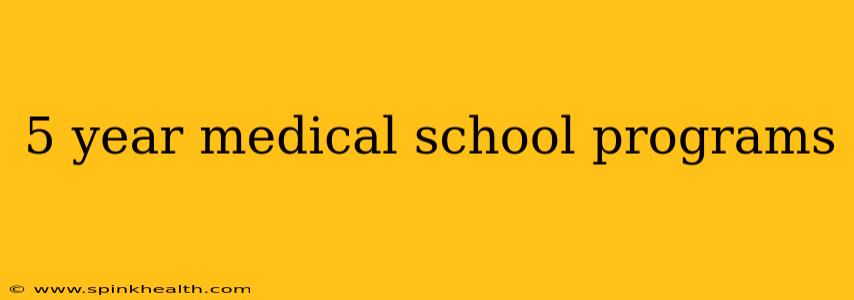Navigating the Accelerated Path: A Deep Dive into 5-Year Medical School Programs
The dream of becoming a doctor is a powerful one, often fueled by a deep desire to heal and serve. For many, the traditional medical school journey—a grueling four years of intense study and clinical rotations—seems a monumental undertaking. But what if there was a faster path? Enter the world of 5-year medical school programs, an accelerated option that's gaining traction for ambitious and highly motivated students. This isn't just a shorter timeline; it's a distinct approach demanding careful consideration and preparation. Let's unravel the complexities and explore what makes these programs unique.
What are 5-Year Medical School Programs?
Five-year medical programs are designed to condense the traditional medical school curriculum into a shorter timeframe. These programs often integrate the first year of medical school into the undergraduate curriculum, allowing students to complete both their bachelor's and medical degrees in five years instead of the usual seven or more. This streamlined approach offers significant time savings, but it comes with its own set of challenges and opportunities.
How Do 5-Year Medical Programs Work?
The specific structure varies across institutions, but the general principle remains consistent: a carefully structured integration of undergraduate and medical school coursework. This usually involves a rigorous undergraduate curriculum with a strong pre-med focus, often requiring early acceptance into the medical program before completing the bachelor's degree. Think of it as a fast track, requiring exceptional academic performance and unwavering dedication from the outset. The accelerated pace necessitates a disciplined and organized approach to learning.
Are 5-Year Medical Programs Right for Everyone?
This is a crucial question. While tempting for its time-saving appeal, a 5-year program isn't a universally ideal choice. These programs are incredibly demanding, requiring a higher level of self-discipline, time management skills, and resilience than traditional programs. Students need to be highly motivated, possess exceptional study habits, and be comfortable with a fast-paced learning environment. The intense pressure can be overwhelming for some, potentially leading to burnout.
What are the Advantages of a 5-Year Medical Program?
- Time Savings: The most significant advantage is the reduced time commitment. This translates to quicker entry into the workforce and reduced student loan debt accumulation (although the cost per year might be higher).
- Earlier Specialization: Depending on the program, earlier entry into the medical school environment can facilitate quicker access to specialized fields of interest.
- Cost Efficiency (Potentially): While tuition might be higher per year, the overall cost might be less due to the reduced number of years in school.
What are the Disadvantages of a 5-Year Medical Program?
- Intense Pace: The accelerated curriculum can lead to burnout and stress. Students need exceptional time management and self-care strategies to succeed.
- Less Flexibility: These programs offer less flexibility in choosing electives or exploring extracurricular activities compared to traditional programs.
- Limited Personal Time: The rigorous academic demands often leave little time for personal pursuits, social life, or other commitments.
What are the Admission Requirements for 5-Year Medical Programs?
Admission to 5-year medical programs is highly competitive. Expect rigorous academic standards, strong MCAT scores, impressive extracurricular activities, compelling letters of recommendation, and a clear demonstration of your suitability for this demanding pathway. The application process is generally more stringent than for traditional medical schools.
How Do 5-Year Medical Programs Compare to Traditional Programs?
The core difference lies in the pace and integration. Traditional programs offer a more gradual learning curve, allowing for a greater degree of flexibility and potentially reducing the risk of burnout. 5-year programs prioritize speed and efficiency but require unwavering commitment and resilience. The best choice depends entirely on the individual student's personality, learning style, and capacity for handling intense pressure.
Ultimately, the decision of whether to pursue a 5-year medical program is deeply personal. Carefully weigh the advantages and disadvantages, honestly assess your capabilities, and consider your long-term goals. It's a challenging path, but for the right student, it can be a rewarding and efficient route to a fulfilling career in medicine.

